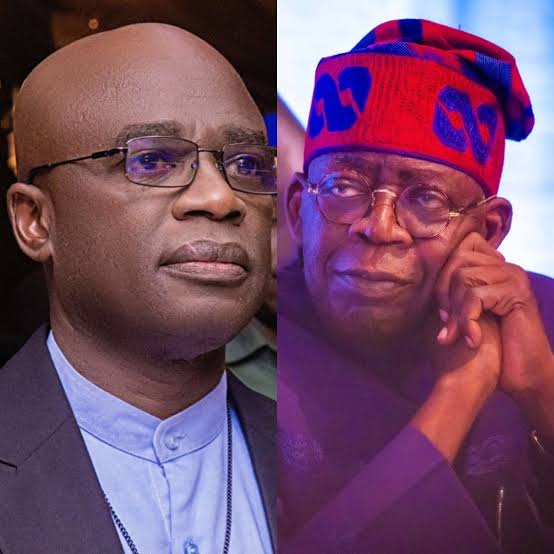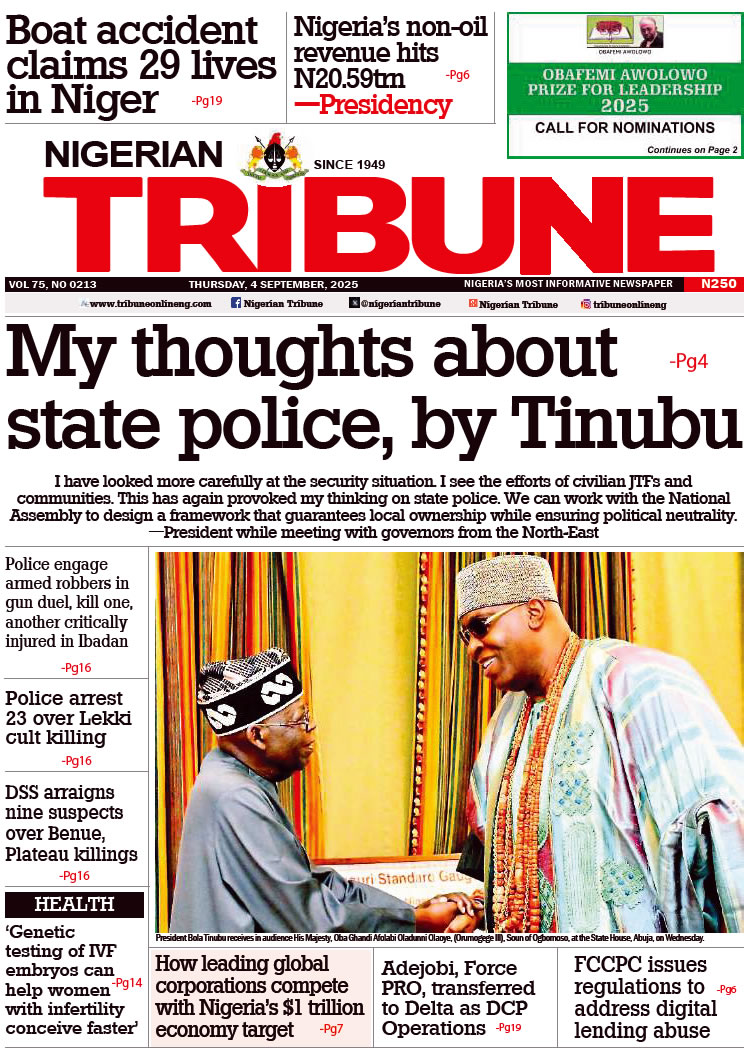MORE global attention is expected to be paid to Nigeria as President Bola Tinubu visits Benue State today following the escalating massacre of people in the North-Central state.
Apart from the major international media platforms, the gruesome killings elicited grave concerns from world leaders, including the Catholic Pope, who admonished the Nigerian authorities on the urgent need to end the scourge. Last weekend, about 200 persons were reportedly mowed down by suspected herdsmen, while more than 45 others were gruesomely killed in another community two days earlier. Recall that the tenure of the immediate past governor of the state, Samuel Ortom was also characterised by such callous and mindless killings with the former governor narrowly escaping death in the hands of some criminal elements, who made the state almost ungovernable for him.
Government mandate
The visit of Mr President to Benue is highly instructive. The primary function of government under the constitution is the protection of lives and property.
Though governors are recognised as the chief security officers of their states, they lack the actual power and force to dutifully exercise the mandate under the constitution. This is because the command structure and hierarchy is unfortunately vested in the Federal Government. The anomaly informs the strident and persistent calls for the creation of state police and holistic restructuring of the nation’s security architecture in tune with the cardinal principles of federalism.
As a response to the carnage, the top hierarchy of the Nigeria Police Force has moved to Benue in the bid to restore sanity and end the frightening carnage, while military top brass has equally relocated to the state in the collaborative attempts to clear the gathering storm. The visit by the president is a climax of the spirited and frantic deployment of troops to arrest the scourge and fulfill the primary duty of a sovereign state to the citizens.
‘One killing too many’
In the last few weeks, the death toll has been incomprehensible and scary. Many people have fled their ancestral homes and sought refuge elsewhere. And many concerned individuals and experts opine that the Benue crisis appears intractable due to socioeconomic and political issues. One of them is the ethno-religious factor. Coupled with this is the economic, which has led to clashes between farmers and herdsmen.
The other issue is the nature of Nigeria’s borders, which top government functionaries admit are porous and make the citizens vulnerable to unwarranted attacks by criminals. The Chief of Defence Staff (CDS), General Christopher Musa, said those that perpetrated the Benue massacre have no hiding place, as the authorities were poised to smoke them out wherever they may be. He described the latest carnage as one killing too many.
Minister of Interior, Dr Olubunmi Tunji-Ojo, underscored the desirability of improved funding of the security agencies. He also offered other suggestions on how to raise the bar. He advocated for laws that would prevent future security challenges in the country. He also wants government to adequately fund the nation’s security agencies and merge those ones that are no longer relevant.
Expert speaks
Kabir Adamu is an expert on security matters. He spoke on the British Broadcasting Service (BBC), on the wave of unwholesome killings in Benue State and other troubled spots in Nigeria. He noted that about 1,043 people were killed in Benue between May 2023 and May 2025. Adamu, who is the head of Beacon Security and Intelligence Limited, explained that environmental degradation, notably climate change-induced desertification and irregular rainfall patterns in Nigeria’s northern regions, plays a critical role.
“These pressures compel herders to migrate southward, including Benue State, where resources are already strained. Rapid population growth in these areas further intensifies the competition for limited land and water, creating a self-reinforcing cycle of environmental stress, migration, and conflict escalation,” he noted.
Adamu noted that a federal joint task force was launched in 2018 and then another one last month, the Forest Guards. According to him, “This national system aims to recruit armed operatives to secure forest reserves from terrorists and criminals.” He identified the need to tackle security and economic issues as the way out of the debilitating crisis. He challenged the government to “deploy more tactical and intelligence-based special forces to Benue State, ensuring their presence is sustained and adaptable to shifting threats.”
Former Vice President Atiku Abubakar who noted that the killings in Benue has reached a devastating crescendo, decried that, “For years, families have buried their loved ones in silence, villages have been ravaged, and communities shattered.” In the same vein, another former presidential candidate, Dr Gbenga Olawepo-Hashim, in commiserating with the government and people of Benue on the ceaseless killings in the state, tasked the authorities to quickly tame the ugly tide. “The bloodletting has gone on for far too long,” he said.
ALSO READ: Alleged firearm possession: Police interrogate Pastor Adefarasin
On his part, IGP Kayode Egbetokun noted that the Benue killings amounted to “attacks on the sovereignty and integrity of the nation,” because “an attack on any community of Nigeria is an attack on the entire country.”
Constitution review and State Policing
Incidentally, as the public outrage triggered by the Benue episode subsists, the issue of state police propped up at the constitutional review legislative dialogue on the national security architecture with the theme “Nigeria’s peace and security: the constitutional imperative,” organised by the House of Representatives Committee on Constitution Review in collaboration with the Office of the National Security Adviser (ONSA). The IGP restated his disposition towards the call for decentralization of the existing Nigeria Police Force (NPF). His words: “Key concerns include the possibility of political misuse of police powers at the state level, lack of funding capacity by most states to maintain and equip a state control force, the potential for fragmentation of national security, intelligence and command, the absence of a regulatory architecture to ensure standard and operational cohesion.
“Instead of fragmenting our policy authority, we propose that the focus of constitutional and legislative reform be directed towards strengthening the Nigerian Police Force through improved funding and autonomy.”
But his position was strongly contested by the Conference of Speakers of state houses of Assembly through the chairman, Honourable Debo Ogundoyin. Ogundoyin, who is the speaker of the Oyo State House of Assembly, said members of the forum remained resolute on their commitment to strengthening the nation’s security institutions. He affirmed their declaration on the fact that, “As the Speakers House of Assembly nationwide, we know exactly where the shoe pinches when it comes to security because we all face our various different types of insecurity in our various states.”
He added: “With constitutional safeguards, clear command structures, legislative clarity, independent oversight mechanisms, and well-defined frameworks for inter-agency collaboration, state police can become a force for justice, accountability, and grassroots protection,” Ogundoyin stated.
Minister of Defence, Mohammed Badaru Abubakar, who represented President Bola Tinubu at the event, also underlined the imperative of a multi-pronged approach to tackling Nigeria’s evolving security challenges. “The growing calls for state police, the challenges of cybercrime and cybersecurity, and the urgent need for improved intelligence sharing demand a more adaptive and cooperative security architecture,” the minister said.
Matters arising
To Governor Hyacinth Alia, the way out of the current trauma appears on the way following the synergy among those relevant authorities to deal decisively with those that have murdered sleep in the state. “We are hopeful that with all hands on deck, we would become victorious and the sorrowful narrative we share today would become a thing of the past,” Alia stated.
As far as the CDS Musa, the incident in Benue amounts to one killing too many, stating that, “We need to change our strategy, look inward, and see how we can address this.”
And for President Tinubu, “The debate over state police is no longer theoretical.” According to him, “It is grounded in the daily fears and lived anxieties of Nigerians: farmers afraid to tend their fields, traders unsure of safe passage, and communities abandoned to self-help.”
Will Tinubu visit restore order in Benue and pave the way out of similar crisis going on in Plateau where there is currently peace of the graveyard? Will the visit lead to the authorities providing posers raised by the allegation that some elements in the security service have been sabotaging military operations in the fight against the criminals? Will it bring about more information on the riddle surrounding the arrest of some military personnel and police and other collaborators accused of selling official arms and ammunition to terrorists and bandits? Will the president’s visit expedite concerted efforts among the critical stakeholders within the corridors of power at the federal and state levels, as well as the three arms of government on the demand for state police?
WATCH TOP VIDEOS FROM NIGERIAN TRIBUNE TV
- Let’s Talk About SELF-AWARENESS
- Is Your Confidence Mistaken for Pride? Let’s talk about it
- Is Etiquette About Perfection…Or Just Not Being Rude?
- Top Psychologist Reveal 3 Signs You’re Struggling With Imposter Syndrome
- Do You Pick Up Work-Related Calls at Midnight or Never? Let’s Talk About Boundaries







